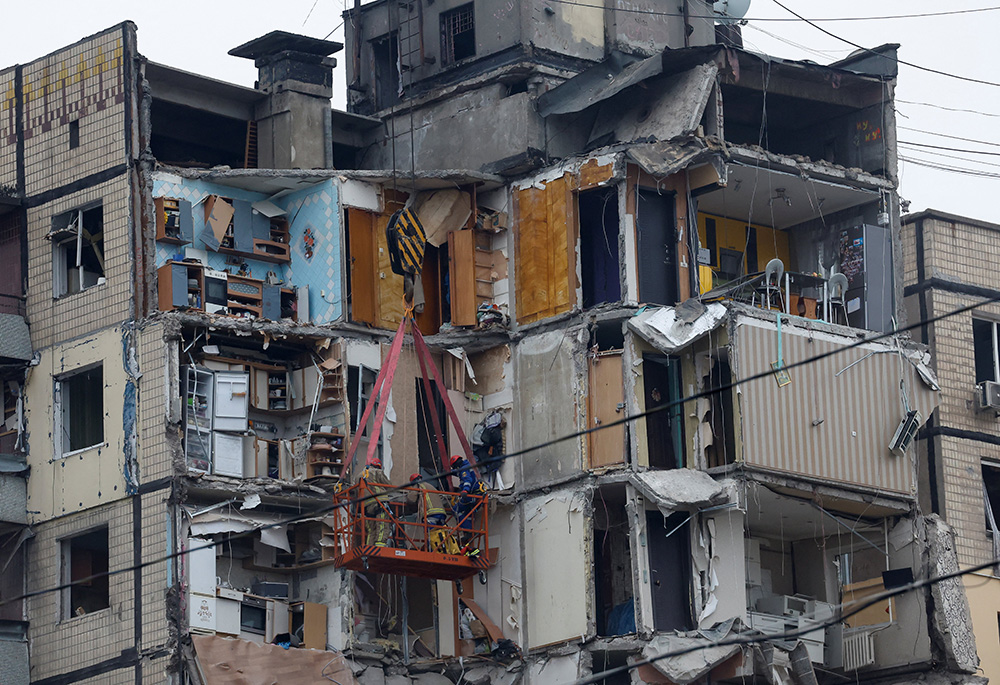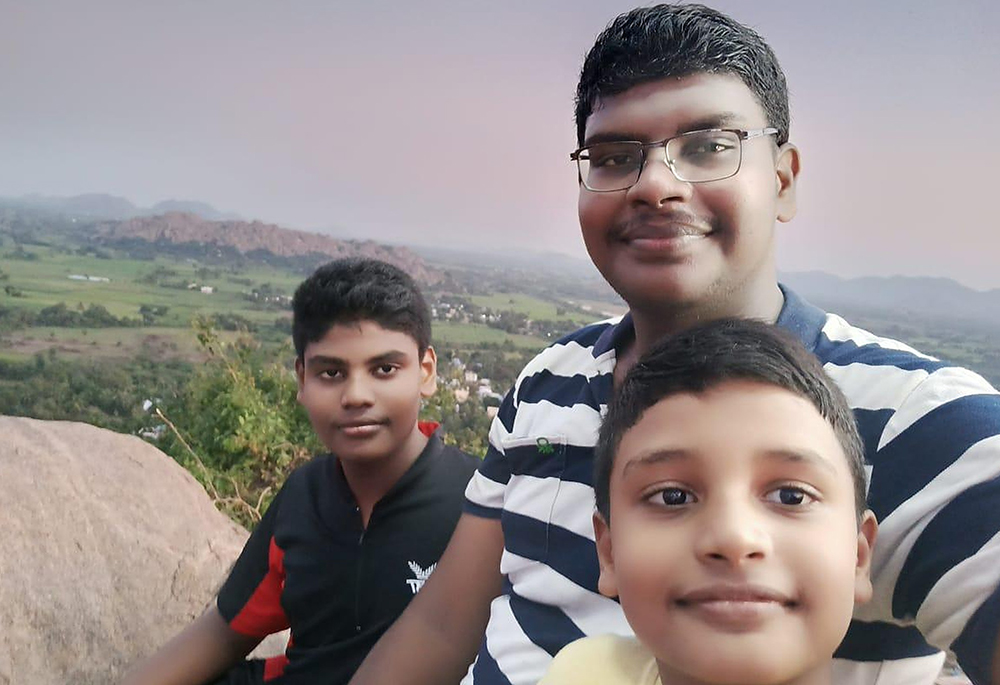
Emergency personnel are seen Jan. 16 working at the site where an apartment block was heavily damaged by a Russian airstrike in Dnipro, Ukraine. At least 30 people were killed in the airstrike, the national emergencies service reported as rescue workers scrambled to reach survivors in the rubble. (OSV News photo/Reuters/Clodagh Kilcoyne)
I have been reading about the Ukraine-Russia war and praying for the war to end. Realizing it has been a year since the war broke out, I intensified my prayers, and decided to research for myself the effect of the ongoing war across the globe. I was surprised to learn how much the war in Ukraine has affected so many people in India.
Recently, I met Sam in the Villupuram district of the southern Indian state of Tamil Nadu. Alan Sam M. intended to study medicine in Ukraine, but is instead now a first-year medical student in Georgia, a country at the intersection of Eastern Europe and Western Asia.
He told me, "Initially, I intended to study in Ukraine because Ukrainian universities have international standards and good reputations. These medical institutes provide high-quality education with the lowest fee structure."
The young man explained that in Ukraine, the Bachelor of Medicine and Bachelor of Surgery (or MBBS) cost ranges from about 400,000 to 600,000 Indian rupees (that is, about $4,840 to $7,260) annually, which is affordable for Indian students.
Whereas in India, the private medical colleges' annual medical fee ranges from about 1,400,000 to 2,500,000 rupees (about $16,950 to $30,266), besides other ancillary and recurring costs. He said that in Georgia, the fee is approximately 700,000 rupees (about $8,475).

Alan Sam M., in the middle, is pictured with his younger brothers Aban Sam and Adan Sam. (Courtesy of Sujata Jena)
On Feb. 24, 2022, Russia invaded Ukraine. As Gareth Price wrote at Chatham House.org, "Since the war in Ukraine began, India has abstained from various procedural votes relating to the conflict, along with the early March resolution censuring Russia for its military actions." Besides, India continues to buy crude oil from Russia, even amid the war.
According to OutlookIndia.com, "Over 20,000 medical students, who fled strife-torn Ukraine, are yet to overcome their mental agony of surviving bomb explosions and missile attacks. However, since they have arrived in India, they have been bombarded with fake and dubious career offers."
Like Sam, there are thousands of students whose preferred destination of study remains Ukraine, along with students from other low-income countries in Asia or beyond. Suddenly, their future becomes a tragedy. The study loans, or all the hard-earned money the parents spent on the education of their children, went in vain. Back home, they live with anxiety, worry, and uncertainty.
Most parents in India want their children to become doctors, even though there is tough competition in this field. In India, aspirants in medical education can afford to study at government-run medical colleges. Middle-class and upper-middle-class students cannot afford to study in private medical institutions, due to exorbitant fees.
I read in IndiaTimes.com, "The National Medical Commission reports that there are 605 medical colleges in India, with a total of 90,825 MBBS seats available each year. While this figure appears large, it pales in comparison to the 1.6 million candidates that attempted the National Eligibility Cumulation Entrance Test (NEET) for MBBS admission in 2021." (The federally-administered NEET is required for admission to medical studies in India.)
I went on to read in the same source that the "majority of Indian students in Ukraine study medicine. Ukraine has the fourth-largest number of graduate and post-graduate specializations in the field of medicine in Europe. Some of Ukraine's state-run universities are well-known for providing high-quality education, and it is believed that Indian parents prefer to send their children to these institutions rather than pay a large fee to enroll in a lesser-known private medical college in India."
According to The Economic Times in 2014, per the United Nations, "India has the world’s largest youth population," with 356 million youths from 10 to 24 years old. India's youth population was even bigger than the current entire population of the United States.
Higher education in any discipline in India is costly. Besides the tuition fee, a student needs to pay for books, stationery, projects, medical and accommodation costs, and especially coaching classes, which are more expensive.
Also, when a student doesn't live in a city, the cost of studying increases with travel, accommodation, food, health, and miscellaneous expenses. As of 2015, more than 70% of Indian families lived in rural villages, and professional and technical studies are available only in cities.
Until the war broke out, many did not know where Ukraine was. Not many, including me, knew why Ukraine was a popular education destination for Indians and others. Also, according to the Centre for the Promotion of Imports from developing countries, "Ukraine is the world’s biggest exporter of sunflower oil by far, ahead of Russia."
The price of edible oil has suddenly doubled since the war. According to the report at TheHindu.com, "India, the world's leading vegetable oil buyer, is dependent on imports of sunflower oil, which constitutes 16% of the total edible oil imports. Before the Russia-Ukraine crisis, 70% of the sunflower oil imported by India used to come from Ukraine and 20% from Russia. But imports have been severely affected after the invasion of Ukraine by Russia."
Advertisement
Every individual is affected because oil is an essential commodity, and it has repercussions on inflation on a global scale.
Last month, I was on a train journey to the southern Indian state of Kerala, along with my sisters in the community. The train was overcrowded. My coach's co-passengers were migrant laborers from northern Indian states to work in southern states like Kerala.
During the two-day train journey, I spent some time talking and interacting with them. A young man told me that every year they go to different cities in search of work for their survival and to support their families back home. He said, "If we could afford to buy food in our native village, we would not move from place to place, leaving our loved ones behind with so many challenges."
The poor work hard and live a hand-to-mouth existence. A sharp surge in the prices of essential commodities directly affects their lives. It is a matter of great urgency for them to make ends meet.
The protracted war in Ukraine is certainly a big blow to the entire world, as Ukraine and Russia are major commodity producers.
Admittedly, the Russian war against Ukraine is causing untold humanitarian, social, economic, and geopolitical crises for the Ukrainians, Russians, and the entire war region and the world at large.
On the recent anniversary of Russia's invasion of Ukraine, I sincerely prayed that the war may end sooner rather than later, and that peace, justice, liberty and goodwill may prevail. I pray for all the people who lost loved ones in the war. The affected people continue to suffer on many fronts, as do the refugees who flee to different parts of the world. The women, children, and others continue to suffer terribly. May God protect everyone from all dangers and threatening situations and be their solace in their uncertainties.
Finally, I pray for the leaders of these countries and those powerful nations that they may become instruments to establish peace in the war-torn region and solve all the contentious and outstanding issues through sustained dialogue, diplomacy, and reconciliatory political engagement for the sake of the common good.







